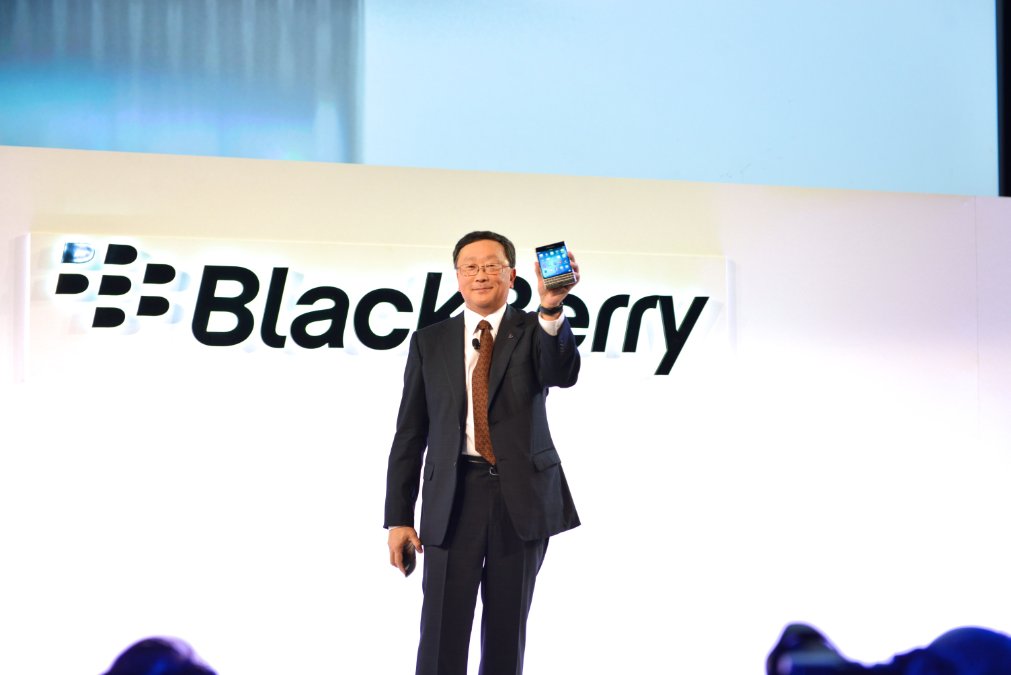HOW I TURNED AROUND THE FORTUNE OF A DYING BLACKBERRY IN ONE YEAR – CEO

The CEO of BlackBerry, the mobile phone company, John Chen, in this LinkedIn article he wrote explains lessons to learn from how he has been able to turn around the fortune of the company which many people had written off as in unrevivable coma when he took over last year. I think I agree with him as BlackBerry is fast regaining momentum and I can see their products, especially the Q-series, still gaining grounds in markets.
*********
SOURCE: LINKEDIN
If you were to ask any CEO, “Would you like to turn around a company?” the answer would likely be, “No way.”
When I took on the role of BlackBerry CEO one year ago, we were facing tremendous challenges as a company. The markets for devices and services had been changing dramatically for the past few years, and our positions in them had deteriorated. Addressing these realities required us to focus on one thing: innovation. Innovation is what the world demands of technology companies like BlackBerry. Building a stable platform for us to be able to focus on innovation again has been the foundation of our turnaround. The individual strategies to enable this flowed naturally from that imperative.
Create a Problem-Solving Culture
When an organization is in a funk, a lot of people understand the problems. Not too many people understand the way out of the problems.
When you only talk about the problems, you drag everyone down. Energy dissipates; hopelessness reigns.
A turnaround culture must be positive. Employees need to have the hunger – and confidence – to get things done. Everyone needs the same single-minded desire to win.
People have asked me, “Why do you want to do turnarounds?” I think it’s similar to working an emergency room. When a patient comes in, you don’t ask, “Why is that person hurt?” You help him or her get better.
That is the culture that’s needed: one that focuses on fixing things and finding solutions, not on the obstacles before you.

At the launch of the BlackBerry Passport, which is getting many great reviews and is selling-out.
Maintain the Sense of Urgency
After you achieve several targets and hit some milestones, it’s easy to lose some of your urgency. That can be fatal to your ability to get things done.
When you’re in turnaround, every decision feels like it counts twice as much. That can lead some employees and managers to become stuck. That’s the trap called “paralysis by analysis.” Well, some parts of the analysis you don’t need to – and probably shouldn’t – complete.
If your front porch is on fire, you wouldn’t stop to calculate how long it would take for your house to burn down. You just go stop the fire.
In BlackBerry’s case, we cut costs dramatically and doubled down on reducing losses and growing profits. We still have a few water buckets on hand. But no one is cooking our funeral dinner on the flames, because we took action.
Take Care of your Company like it’s your Home
Things that are near and dear to us, we naturally take better care of: our family, our home, our health. We take care to ‘sweat the small stuff’, because we care. That’s the attitude I have about BlackBerry, and which I hope my employees have, too.
Here’s an example: At BlackBerry, we took a look at all of the phone accounts we were paying for. We found one manager who had eight telephone accounts for employees that had already left but which we were still paying for. Their accounts were never turned off.
This may seem small in the scheme of things. But the small things add up. Still, it’s not so much about the value. It’s the level of care. I wouldn’t pay for eight phone lines at my home if I’m only using one. And that sets the tone for everything else we do.
Know Thyself
Every question has multiple answers; every problem has several solutions. Even decisions – every one involves some give and take. So don’t focus on finding the perfect strategy – most of the time, there isn’t one. Because with every benefit, there’s also always a cost.
At a prior company I turned around, we started investing in enterprise mobility at a time when we were only known as a provider of databases and data warehouses. That had many costs – switching development dollars to an unproven industry, as well as taking away management attention when we were in a data dogfight with our competitors. But it also had a huge benefit: giving us an early lead in what proved to be a very important space. That bet paid off, and was key to our eventually selling to SAP for $5.8 billion, 14 times our lowest valuation just after I took over as CEO.
When you know yourself, you know what your long-term goals and strategies are. That makes it easier for you to decide on good – note I didn’t say right – decisions. Right implies perfect. And consistent execution and hard work will outweigh any individually poor decision over the long haul. And I’m in it for the long haul.
Empower Employees to Take Risks
Many people know what’s the right thing to do, but are afraid to speak out. They see others making avoidable errors and think to themselves, “I knew that wasn’t the right thing to do,” without saying anything.
People either don’t want to deliver bad news, or they’re not willing to challenge enough – in a respectful way – on some of the decisions.
That culture has got to change.
Of course, you don’t want to take it to an extreme, where every tiny decision is open for debate. Nothing would get done if consensus needs to be reached all the time. There’s a time to engage your leaders appropriately, and those opportunities must be part of your culture. Because…
Everyone has a Role
If you empower employees, they will speak out on bad decisions or take the initiative to solve problems. No matter what their level, everyone can make a difference. They can help evangelize to customers, engage with partners, reduce costs and waste, and help on your overall strategy.
Creating this open-ness requires a few things. Leaders need to listen and be humble. And your organization cannot be too siloed or top-down. Otherwise, it makes it difficult for people to share their ideas.
Besides, you’re already paying your employees! Why not let them take initiative – you’ll get the results.
All in all, a turnaround culture is one that enables everyone to pitch in to get things done. That requires focusing on a goal, and empowering employees to take risks and go the extra mile.
That’s how you win.
Established in March 2013, JarusHub is a Nigerian information hub with focus on career and management. It is rated Nigeria's most authoritative destination for online career resources. It parades an array of Nigerian professionals who share their career experiences with a view to bridging career information gap and mentoring a generation to success. Whether you're a student, a recent graduate or an established professional, or even an executive, you will always find something to learn on JarusHub. All enquiries to jarushub@gmail.com or 0808 540 4500. Facebook: www.facebook.com/jarushub; Twitter: @jarushub or @mcjarus.
Career Q&A with Jarus: Oil & gas career, poor CGPA
September 17, 2023What is Career Counselling? How to choose the Right Career?
October 24, 2022Career Advice: Play to Your Strength
March 6, 2022
4 comments
Let us have your say by leaving a comment belowCancel reply
Recommended For You
-
Your freedom to fire your boss or employee
December 20, 2013 -
REDUCING UNEMPLOYMENT THROUGH INVESTMENTS BY NIGERIANS
April 8, 2014






Lovely hints!
This is inspiring in its entirelity. I remember predicting the end for blackberry a couple of years ago. Unfortunately for me, it aint dead yet. The craze for BB is still there!
Same here. I also predicted their death. They are bouncing back. It appears BB may not leave soon.
Hmmmmmmm……..oh yes!!! not bad for a Chinese man becoming the CEO of a Canadian company…..well everyone needs to claim some credit but bears in mind that Fairfax invested a billion dollars when he took up the position as CEO,
And if we critically analyze what john Chen has done….
for me the major thing is has done is to cut operating cost.
the only major device he has claimed credit for is the BlackBerry passport and which is still yet to claim grounds in the market as it has a weird shape, and the BlackBerry classic with the upcoming 10.3 os is still yet to arrive (traditionally BlackBerry never keeps to lauching dates and time that doesn’t seem to change soon even with John Chen lol)
BBM already went cross-Platform by d previous CEO Thorsten Heins, so no credit for that
I like the tips he gave which sound like his watch word or what keep him and his team going — works for him fine!!!
But m a firm believer if SWOT ANALYSIS
If any ceo could do their swot analysis well. And timely things could have turned out differently,
at every point in time a firm needs to look at its strength, ie it’s selling point what it’s users are attracted to, where they have monopoly (messaging /bbm) how to capitalize on that strength!!!
Assuming bbm went cross platform on sale for $10 per download and available in local currency times that by over 10milion downloads that’s capitalizing on its strength to rake in profit,
it’s weakness, what exactly is pulling pple away? Where are things going wrong? What is accounting for loss? Is it battery life, is it lack of apps? Is heavy operating profit? Is it the long start up time or poor syc? Is it cloud storage!!!!! What are our weakness, (timely)
Assuming it’s lack of games and they decided to partner with GTA 5 or EA or gameloft. To make exclusive gaming and BlackBerry versions u could imagine the amount of gaming users that would have stayed back?? Same goes for security etc every weakness be tackled ASAP!!!!
new opportunities, Instead of fighting in exiting market why not exploit new market new areas and niche marketing’s z3 was Indonesian based an example of exploring new markets, Africa still lacks a trade mark device like the USA and apple. (tecno is exploiting the African market fast) BlackBerry has lost market in USA and even the UK, the 2nd hand products account for its African market. Which they are yet to exploit!!!!!!!!!!!!!!!!!!!
BlackBerry should have done more African countries marketing and better ways to tap new opportunies in developing/emerging markets than channel a huge effort to fight in already saturated android filled markets and small acquisitions here and there too,
#opportunies
and
Lastly potential threat , Assuming they bought “Whatsapp’s first before Facebook, which happens to be an competing app and then modify it of some sort to make them run concurrently… other competing devices who are trying to capture business users (BlackBerry selling point) are potential threats, better way to serve business users imagine making an official exclusive Microsoft Office suite for BlackBerry that works and syc d same way it does on laptop (current seller of lumia and windows phone) again the story may have been different…….
SWOT analysis done on a yearly monthly weekly daily hourly basis — (Steve job personally reviewed every app and production line critically every 2 months)
is my firm believe to business success not treating the business like it’s ur home or clapping for yourself at every minor operating profit to just claim some grounds of superficial in due time the profit and the market share will speak!!!!
Still it all boils down to analyzing their strength weakness and opportunities and potential threat
The success of BlackBerry in Nigeria lies solely on its preferential Internet subscription by network providers
The BlackBerry passport is still yet to gain grounds his not magician and he shouldn’t dwell on d little success he has made or else BlackBerry will go back to where it’s coming…so let’s see how things play out.